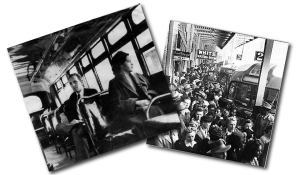 This LIVE ICNC Academic Webinar took place on Thursday, Feb. 25, 2016 at 12 p.m. EST.
This LIVE ICNC Academic Webinar took place on Thursday, Feb. 25, 2016 at 12 p.m. EST.
This live academic webinar was presented by Doron Shultziner, Assistant Professor in the Politics & Communications Department at the Hadassah Academic College Jerusalem.
This webinar is transcribed into Chinese
Watch webinar below:
Webinar content
1. Introduction of the Speaker: 00:45- 02:11
2. Presentation: 02:12 – 36:56
3. Questions and Answers: 37:00 – 55:38
Webinar Summary
This webinar presents the main stages of social movements and their relevance to civil resistance by illustrating those stages on the landmark case of the Montgomery Bus Boycott (1955-1956), a notable movement that ended segregation between whites and blacks on public buses.
The webinar explains how and why black Montgomerians managed to make a transition from a cognitive and emotional climate of fear and inaction to a cognitive and emotional climate that encouraged collective action in face of risks. The webinar explains the characteristics of the protest stage of this Movement and the central factors that kept it going in a year-long struggle, with ups and downs, until the victory was handed by the US Supreme Court. The webinar explains the importance of organization, leadership, solidarity, self-esteem, music, and political factors in the course of the movement. Finally, the webinar explores the internal factors (i.e., movement strategic and political decisions) and the external factors that determined the outcome of the movement in both the legal and political arenas.
The webinar will address these aspects in a way that is helpful for activists to reflect about which stage of their struggle they are in, what they can expect to achieve and confront at each stage, and perhaps even how to prepare for the next stage of their struggle. The webinar is designed for those who are interested in civil resistance and for activists.
Presenter
 Doron Shultziner is Assistant Professor in the Politics & Communications Department at the Hadassah Academic College Jerusalem. He holds a B.A. in Political Science and Middle East Studies (2000), and M.A. (Summa Cum Laude) in Political Science (2004), both from the Hebrew University of Jerusalem.
Doron Shultziner is Assistant Professor in the Politics & Communications Department at the Hadassah Academic College Jerusalem. He holds a B.A. in Political Science and Middle East Studies (2000), and M.A. (Summa Cum Laude) in Political Science (2004), both from the Hebrew University of Jerusalem.
He received his Ph.D. from the Politics & IR Department at the University of Oxford (2008). One of his main areas of research is the intersection between social movements and democratization. He studied the civil rights movement extensively and wrote about the Montgomery Bus Boycott in his book Struggling for Recognition: The Psychological Impetus for Democratic Progress, and in his paper The Social-Psychological Origins of the Montgomery Bus Boycott (Mobilization) which won the Distinguished Contribution to Scholarship Award (2014) from the Section on Collective Behavior and Social Movement of the American Sociological Association.
He teaches a seminar on nonviolent resistance and democratic progress at Hadassah College along other courses on democracy and the history of liberal democracy. Dr. Shultziner has also observed first-hand the Umbrella Movement in Hong Kong during the height of the movement (October 2014) and covered it in the media. He is a social and environmental entrepreneur and founder of Mali – Center for Enterprising Citizens that supports carrying out original ideas and projects to the benefit of society and the environment. He is married to Shalhav and father to Ohad.
Relevant Readings:
- Shultziner, Doron. 2013. The Social-Psychological Origins of the Montgomery Bus Boycott: Social Interaction and Humiliation in the Emergence of Social Movements. Mobilization 18(2): 117-142. [link to full text]
- Shultziner, Doron. 2010. Struggling for Recognition: The Psychological Impetus for Democratic Progress. New York: Continuum Press. (Available here)